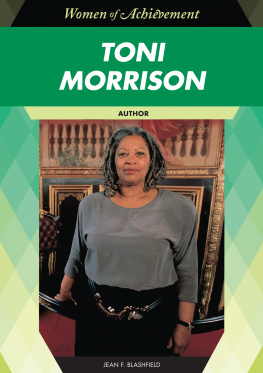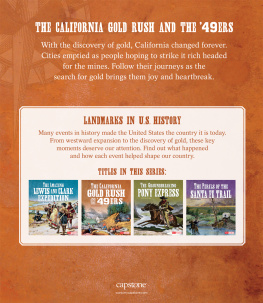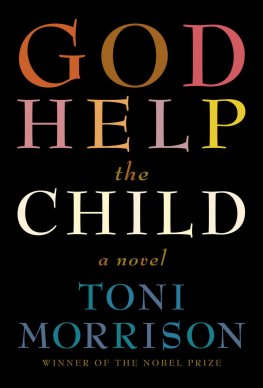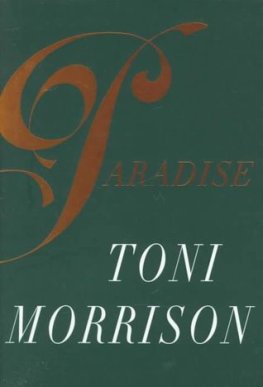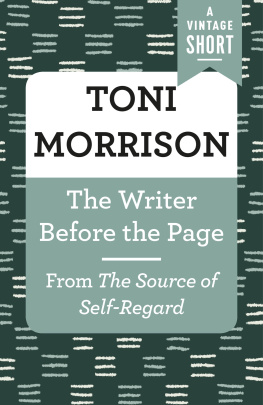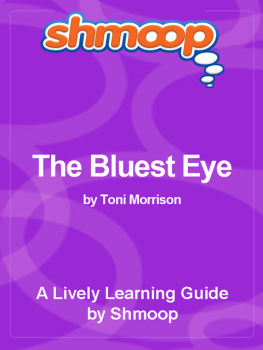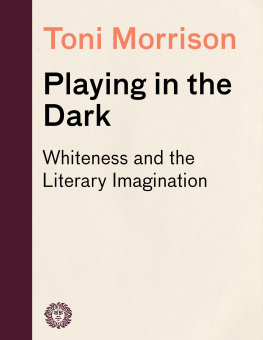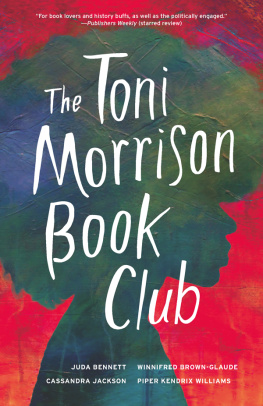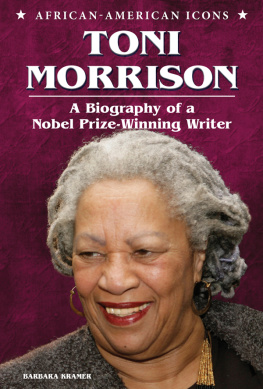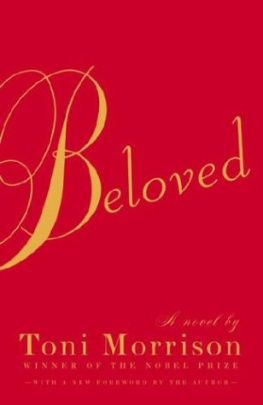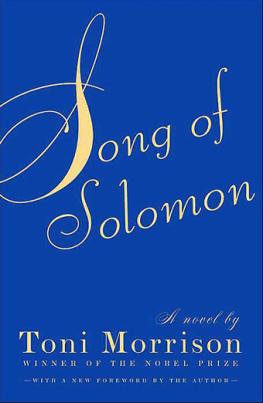Jean F. Blashfield - Toni Morrison
Here you can read online Jean F. Blashfield - Toni Morrison full text of the book (entire story) in english for free. Download pdf and epub, get meaning, cover and reviews about this ebook. year: 2014, publisher: Infobase Publishing, genre: Art. Description of the work, (preface) as well as reviews are available. Best literature library LitArk.com created for fans of good reading and offers a wide selection of genres:
Romance novel
Science fiction
Adventure
Detective
Science
History
Home and family
Prose
Art
Politics
Computer
Non-fiction
Religion
Business
Children
Humor
Choose a favorite category and find really read worthwhile books. Enjoy immersion in the world of imagination, feel the emotions of the characters or learn something new for yourself, make an fascinating discovery.
- Book:Toni Morrison
- Author:
- Publisher:Infobase Publishing
- Genre:
- Year:2014
- Rating:3 / 5
- Favourites:Add to favourites
- Your mark:
- 60
- 1
- 2
- 3
- 4
- 5
Toni Morrison: summary, description and annotation
We offer to read an annotation, description, summary or preface (depends on what the author of the book "Toni Morrison" wrote himself). If you haven't found the necessary information about the book — write in the comments, we will try to find it.
The author of the Pulitzer Prize-winning Beloved
Toni Morrison — read online for free the complete book (whole text) full work
Below is the text of the book, divided by pages. System saving the place of the last page read, allows you to conveniently read the book "Toni Morrison" online for free, without having to search again every time where you left off. Put a bookmark, and you can go to the page where you finished reading at any time.
Font size:
Interval:
Bookmark:
Copyright 2014 by Infobase Learning
All rights reserved. No part of this publication may be reproduced or utilized in any form or by any means, electronic or mechanical, including photocopying, recording, or by any information storage or retrieval systems, without permission in writing from the publisher. For more information, contact:
Chelsea House
An imprint of Infobase Learning
132 West 31st Street
New York NY 10001
ISBN 978-1-4381-4690-4
You can find Chelsea House on the World Wide Web
at http://www.infobaselearning.com
Holding on to the arm of the King of Sweden, Carl XVI Gustaf, the elegant woman entered the Stockholm Concert Hall chamber to the applause of the world's elite. She was once young Chloe Wofford, raised in poverty in an industrial town in northern Ohio, but here in this beautiful chamber in Stockholm, Sweden, and to the rest of the world, she was famed writer Toni Morrison. The year was 1993 and she was here to receive the highest honor the world can give a writer, the Nobel Prize for Literature.
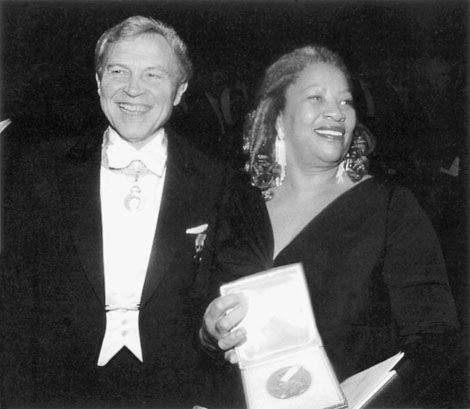
Standing with Nobel Academy Secretary Sture Alln, Toni Morrison accepts the 1993 Nobel Prize for Literature, the highest honor the world can give a writer.
Source: Agence France Presse.
Dressed in a gorgeous, flowing gown designed for her by Bill Blass, the diminutive woman held her head high as she walked before the assembled crowd with pride and joy. The renowned writer had become only the eighth woman and the first African-American woman to win the literature prize, the most prestigious international writing award.
The Nobel Prize awards originated with Alfred Nobel, the Swedish chemist and industrialist who invented dynamite. Nobel's inventions made him quite wealthy, and when he died in 1896, he designated in his will the creation of five prizes, to be awarded in the fields of physics, chemistry, medicine or physiology, literature, and peace. (A sixth prize for economics was added in 1969.) The Nobel Prizes have been awarded annually since 1901, five years after his death.
The winner of the literature prize is determined by the Swedish Academy, an organization founded in 1786 to ensure the purity of the Swedish language. The academy did not function with any great consistency until after the death of Alfred Nobel, whose will gave it the task of administering the literature portion of the Nobel Prizes. Today the Swedish Academy consists of 18 members, all of whom are elected for life.
Each year the Nobel season begins in October when journalists from around the world gather in a room at the Stockholm Stock Exchange. There the journalists wait, buzzing and chattering, until, exactly at one o'clock, a clock strikes and the room's tall doors swing open. The permanent secretary of the Swedish Academy walks in to announce which world writer for that year best fulfills Alfred Nobel's call for "the most outstanding work in an ideal direction." In 1993, the name announcedToni Morrisonastonished the literary world.
Most observers had expected the prize to go to someone who wrote in a language other than English, since for the past two years, the Nobel Prize for Literature had gone to English-speaking writers. Academy members seldom gave back-to-back awards to writers who used the same language. To do so for a third year was highly unusual. But the academy made the basis of its choice quite clear, praising Morrison's novels for their "American reality" and stating, "She delves into the language itself, a language she wants to liberate from the fetters of race. And she addresses us with the luster of poetry."
After the announcement of the prize winner, Sweden issued a new postal stamp with Toni Morrison's picture on it. This was only the second time the country had produced a stamp honoring the winner of the Nobel Prize for Literature.
The Nobel Prize award ceremonies usually take place during the second week of December, and are accompanied by several days of festivities. Honorees attend speeches, receptions, lunches, dinners, and special concerts. They travel in chauffeur-driven limousines, drink champagne, and wear fancy gowns or white tie and tails.
In 1993, Nobel week swept Toni Morrison up into activities from December 6 to 10. On the Tuesday, December 7, she lunched at the American Embassy. Afterward Stockholm police escorted her to the Swedish Academy to deliver her Nobel Lecture in Literature.
Standing at the podium in front of a packed audience in the Academy's Grand Hall, the celebrated author began her speech with a story: "Once upon a time there was an old woman. Blind but wise." The tale gradually evolved into a meditation on language, as an entranced audience hung on her every word. The powerful language, with its moving metaphors and vivid descriptions, seized the imagination of every listener.
Morrison concluded her presentation with a statement on the importance of writing: "We die. That may be the meaning of life. But we do language. That may be the measure of our lives."
Two standing ovations greeted Toni Morrison's words. According to friend and critic John Leonard, the crowd consisted of "sons, sisters, nieces, cousins; editors, agents, critics; professors from Princeton, Harvard, and City College; well-wishers, witnesses, celebrants, pilgrims, support-groupies, friends."
During the next two days, every major publisher of Toni Morrison's books threw a reception to honor the author's accomplishments. On Thursday evening, she attended the grandest reception of the week, given by the Swedish Academy. And on Friday, December 10, Toni received her Nobel Prize at the beautiful, modern Stockholm Concert Hall.
How did young Chloe Wofford of Lorain, Ohio, come to stand on the stage of that great hall and receive the prestigious Nobel Prize in Literature? A private person, Toni Morrison has not revealed very much in interviews about her personal background and the choices she has made in life. A careful reading of her novels will not reveal many answers as she makes few direct autobiographical references in her stories.
But still, Morrison's writing contains many clues about where the author came from and the society that shaped her life, as well as the lives of many African Americans. As Paul Gray of Time magazine once observed, Toni's novels are "intensely imaginative responses to the specific historical and social pressures she has experienced as a black woman in the U.S. The imagination is all hers; the pressures have been the inheritance of millions."
The woman who would come to be known as Toni Morrison was born on February 18, 1931, in Lorain, Ohio, a small steel-mill town just west of Cleveland. Her father, George Wofforda shipyard welderand her mother, Ramah Willis Wofford, named their second daughter Chloe Anthony Wofford. Soon Chloe had two younger brothers as well.
It wasn't easy being the second child out of four children, the famous author later recalled in an interview. "I was the one with the anonymous birth order," she explained. "There was my older sister, firstborn; me, void; my younger brother, first son; and another son, the family baby. Feeling left out, and trying to attract attention, I became the noisiest of them all."
Chloe was born into a family that was used to overcoming difficulties. Her mother, Ramah, had moved to Lorain at the age of six when the Willis family migrated north from Greenville, Alabama, in the early 1900s. In the South they had been sharecroppersfarmers who raised crops on someone else's land in exchange for a share of the harvest. The lives of sharecroppers were uncertain. They had no rights and could be thrown off the land at any time. The landowners controlled the seed supply as well as the equipment for measuring the harvest. Sharecroppers might end the growing season owing money to the owners instead of having made something to live on. And when a growing season went bad, sharecroppers were the first to suffer.
Font size:
Interval:
Bookmark:
Similar books «Toni Morrison»
Look at similar books to Toni Morrison. We have selected literature similar in name and meaning in the hope of providing readers with more options to find new, interesting, not yet read works.
Discussion, reviews of the book Toni Morrison and just readers' own opinions. Leave your comments, write what you think about the work, its meaning or the main characters. Specify what exactly you liked and what you didn't like, and why you think so.

